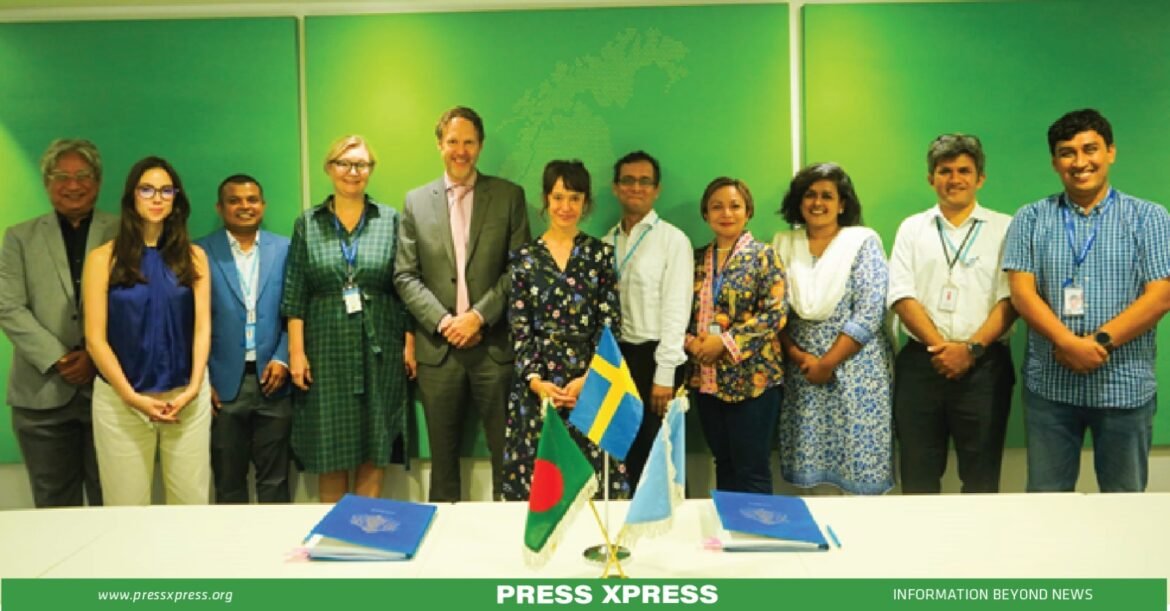This agreement secures continuous funding for the project over the next two years, covering the period from 2023 to 2025.
Climate change vulnerabilities are gradually increasing in developing and underdeveloped countries. Bangladesh, with its limited economic, social, technological, and institutional resources, is especially hard-hit by these severe consequences. This global issue is anticipated to impact various factors causative to migration, mainly affecting the most vulnerable communities.
On August 31, 2023, an agreement was formalized at the Swedish Embassy, where Sweden committed its support to the Local Government Initiative on Climate Change (LoGIC) project. This agreement secures continuous funding for the project over the next two years, covering the period from 2023 to 2025.
You can also read: ASEAN Launches Talks on $2.7 Trillion Digital Economy Pact
As reported in a press release, the signing of the agreement was executed by Alex Berg von Linde, the Swedish Ambassador to Bangladesh, and Stefan Liller, the UNDP Bangladesh Resident Representative, representing their respective organizations.
Vulnerable Communities in Bangladesh
Logic has played a pivotal role in delivering climate adaptation funding and assistance to the neediest households, unions, and Upazilas in Bangladesh. This initiative is dedicated to strengthening climate resilience in the country by placing a strong emphasis on local leadership, creative solutions, and nature-based approaches.
As a result, numerous vulnerable women and households have taken the initiative to create savings groups, cooperatives, and businesses, enabling them to effectively address climate-related challenges and thrive economically.
LoGIC Project Expands to Chittagong Hill Tracts and Beyond
Over the upcoming two years, the project will commence in the Chittagong Hill Tracts and will continue in the seven districts that are particularly vulnerable to the effects of climate change. Furthermore, the project will assist in the incorporation of the LoGIC approach into the national planning, budgeting, and allocation system for local governments and communities as well.
Representatives from UNDP, UNCDF, the European Union, the Government of Bangladesh, and Sweden unite, symbolizing their collective commitment to the LoGIC project and climate resilience.
Opinions
Swedish Ambassador to Bangladesh Alex Berg von Linde highlighted Sweden’s pride in helping create the LoGIC model, which supports climate-vulnerable and remote communities, especially women affected by climate change. She emphasized that the LoGIC initiative has substantially enhanced the lives of the poorest and most vulnerable individuals. According to her, it is now the moment to expand this effective model of local adaptation financing. Communities are utilizing it to build a more sustainable future and to address the challenges posed by climate change.
Stefan Liller, the Resident Representative of UNDP in Bangladesh, emphasized the organization’s steadfast dedication to partnering with the government and other stakeholders. Their primary objective is to guarantee that climate change is integrated into local planning and financial processes, all the while offering strong support for effective adaptation efforts. She further emphasized, ‘The LoGIC project stands as a remarkable example of how global cooperation can aid Bangladesh in tackling climate change obstacles. We extend our appreciation to Sweden for their continuous backing, not just for this initiative but also for numerous other vital projects within our nation.’
Aims of the LoGIC project
The LoGIC initiative started in 2016, is a teamwork project with many supporters, including the Government of Bangladesh, UNDP, UNCDF, the European Union, and Sweden. Its objective is to strengthen the abilities of at-risk communities, Local Government Institutions (LGIs), and civil society groups in planning and funding solutions for adapting to climate change in specific vulnerable regions. Later, Denmark became a member of this partnership.
UNDP
UNDP started working in Bangladesh in 1973. Since then, UNDP and its partners in the country have achieved important goals in governance, reducing poverty, dealing with climate change and disasters, and meeting the Millennium Development Goals (MDGs). UNDP collaborates with government agencies and partners to help Bangladesh develop economically and socially.


